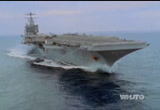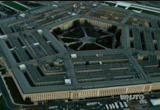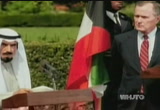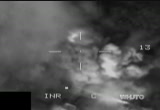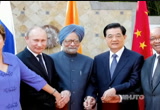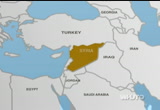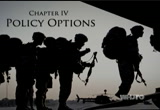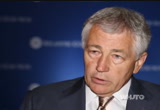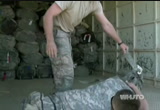tv Great Decisions in Foreign Policy WHUT February 4, 2013 8:30am-9:00am EST
8:30 am
(instrumental music) >> for decades the rich and powerful united states has acted like a global policeman, but can we still afford to flex our military might in conflicts that aren't ours? >> what we're looking at is an environment where the world's policeman for so many decades is suddenly just not willing to be the traffic cop on every beat. >> there is no defining doctrine that threads its way from administration to administration over american history that makes clear where we will act and where we won't act. >> interventions are dangerous because interventions always come with rather significant unintended consequences. >> narrator: in a democracy, agreement is not essential, but participation is.
8:31 am
>> never before in our history have we been so interconnected with the rest of the world. >> foreign policy is actually not foreign. >> america has faced great hardship before and each time we have risen to the challenge. >> the ultimate test is to move our society from where it is to where it has never been. >> join us as we explore today's most critical global issues. join us for great decisions. >> great decisions is produced by the foreign policy association, inspiring americans to learn more about the world. sponsorship of great decisions is provided by credit suisse, eni, the hurford foundation, and pricewaterhousecoopers llp. >> coming up next, the intervention calculation. (instrumental music)
8:32 am
>> historically the u.s. leaned heavily on strategic interventions to help counter the influence of communism. >> the reagan doctrine was a notion that we would support those that sought to oppose soviet domination. >> during the cold war there was a polarized world - there was the soviet union, there was the united states and a lot of our interventions were used to block the advance of communism, and so very ideological basis for our, our interventions. >> and the u.s. has long retained the power to intervene at will. >> the united states has the capability, military capability, the power, literally the sort of capability to get things done. in addition it has the moral suasion and it has the ability to bring others along. so with that comes a lot of responsibilities. >> we have to understand the role that the united states has played since the end of the second world war and still plays today
8:33 am
and that is as a provider of security, not only to itself, but to lots of nations around the world. >> i think the important thing to think about is that throughout my adult life, and i've lived a long time, 80 years, the united states of america has contributed to a more stable and peaceful world. we've provided leadership. we've helped strengthen the ribcage in the globe and we've done so by having strengths and recognizing the truth. >> i don't know if we're indispensable, but i think given our values, given our moral authority in the world, i think we have an obligation to help in, in some instances. >> but generally there are three pillars to any kind of intervention. there's a security pillar, there's an economic pillar, and there's governance and rule of law pillar. if you can craft a strategic plan so that you can bring the proper response and shape it in such a way that makes a huge difference.
8:34 am
>> but intervening for strategic purposes can be a slippery slope and does not always end well. >> some people argue that we should only intervene when our vital national interests are threatened. it's very hard to define what are our vital national interests and frankly many presidents have found have found it useful to use military force even when there was not a vital interest. >> if you look at the period since the end of the cold war, you know, you see that the west tends to use military intervention as one of its options when it has a diplomatic problem, and there's a certain sort of pattern, and it often involves going in militarily, and it often ends up overthrowing a regime that the americans have a problem with. >> interventions are dangerous because interventions always come with rather significant unintended consequences. one of the reasons we're in so much trouble in afghanistan is because we went well beyond our mission. we accomplished our mission, then we took our eye off the ball and we, uh, intervened,
8:35 am
invaded iraq and occupied iraq and now 12 years later we're not sure what our mission is. is our mission to eliminate taliban? that never was our mission. is it nation building? um, is it sending children to school? is it building sewer systems? is it going after al-queda? all those factors are complicated, but they have to be carefully thought through. (instrumental music) >> economic interests have always played a significant role in u.s. interventions around the globe. >> i would argue that the strategic interests are more obvious than the economic ones, although if you look closely enough you'll find that the two are almost inextricably intertwined. if you look at all interventions that the united states has engaged in from kosovo, to bosnia, to somalia, uh, to libya, to iraq, for that matter, you will find an economic component. >> maintaining access
8:36 am
to certain markets, most often oil, is a common consideration. the u.s. drove iraq out of kuwait in the 1991 gulf war not just to protect its ally from foreign belligerence, but to protect the flourishing oil trade as well. >> i'll give you an example where i think i was wrong, where i'm sure i was wrong. when george bush, the first george bush, went into to kuwait to kick the iraqis out of kuwait he was right. i voted against that because i was afraid, ironically, that george bush, the father, would act the way george bush, the son, did and go too far. >> a powerful iraqi army invaded its trusting and much-weaker neighbor kuwait and moved south to threaten saudi arabia. our goal's defined and familiar. iraq must withdraw from kuwait completely immediately and without condition. this is not, as saddam hussein
8:37 am
would have it, the united states against iraq. it is iraq against the world. >> and in libya many observers noted that both american and european companies would be happy to see a more pro-western government in charge. >> you can argue that in terms of the u.s. and western economic interests the fact that libya is again pumping lots of oil and helping keep the price of oil down means who cares how these places are governed? that's for the libyans to decide and maybe that's the sensible answer. if we tried to go in and create government structures as we tried to do in iraq we'd fail anyway. >> there were other cases were the interests are seriously real, but they may not be vital. that's the case in libya. in libya we found one of the situations where indeed the interests of our allies were more directly affected than our own interests, our own national interests. libyan territory is 175 kilometers from nato territory,
8:38 am
uh, and what was happening inside libya was having a major impact on the possibility of refugees and, indeed, the possibility of maintaining energy flows. >> i take issue with the conspiracy theorists who argue, for example, that wars are conducted merely for oil, um, and then i, i, but i also take issues with those that argue that economic issues should not factor into american foreign policy thinking when, when it comes to intervention at all. both of those i think are, are, in reductive and naive. and a u.s. policy maker has to keep both of them in mind when making a decision about whether or not to intervene. (instrumental music) >> rwanda, bosnia, somalia, libya... at one point political violence in each of these faraway places was claiming thousands of lives and it was in our power to stop the bloodshed.
8:39 am
at kitchen tables and in town halls across the u.s. many asked, "if not us, who?" >> humanitarianism is something that's intrinsic to our country. uh, we can't turn a blind eye to people who are suffering. well i think it creates some kind of leadership challenge for us to be able to think through what can we do? what are the limits to what we can do? >> certainly the united states have intervened on humanitarian grounds because we don't want to live in a world where there's genocide and where people are slaughtered. we, we've witnessed enough of that. >> one of the reasons that libya was seen as a "just" and perhaps positive, from an america foreign policy perspective, experience was that it was put in the framework of humanitarianism, of the responsibility to protect. so it was seen as a humanitarian intervention. >> after the world witnessed genocide in rwanda and bosnia
8:40 am
and the u.n. adopted measures to hold governments accountable for the protection of their own citizens. >> the doctrine of the responsibility to protect, as you know, came out after the nato intervention in kosovo without the security council mandate and at that time kofi annan was posing the question, you know, when it is legitimate for like-minded countries, nato in that case, to step up and come in and protect civilians without having the security council approval. >> the r2p standard as it's known is pretty basic. it says that when a country is unwilling or unable to protect its citizens from mass atrocities it is now the responsibility of the world community to intervene. >> i am a strong believer in the doctrine of the responsibility to protect which was adopted by all the world's nations in 2005 and says, "if you are a sovereign nation you have a responsibility to protect your citizens from genocide,
8:41 am
ethnic cleansing, crimes against humanity, grave and systematic war crime. long-term a world in which a dictator has to think twice before he starts massacring his own people is a world that is safer and better for the united states and for everyone and that by acting under this doctrine we can get to a place where dictators will think twice. >> part of what troubles many people the notion of responsibility to protect, or what's known in the, uh, in the foreign policy world as r2p is that many of its proponents believe that the purity of r2p has to be unsullied by american interests. we have a responsibility to protect, but only if we don't have strategic interests there. >> it's sort of interesting because, you know, in 2005 all the world leaders got together and they had a summit in new york and they passed this document, this declaration of sort of intent, and in that they endorsed this notion that governments have
8:42 am
a responsibility to protect their own citizens from mass crimes, genocide, massive crimes against humanity. there's no kind of mechanism for enforcing this. >> but there is nato. >> nato became the military arm of the international community to deal with the extraordinary atrocities that were seen for the first time since world war ii right here in the middle of europe. uh, concentration camps in bosnia, ethnic cleansing throughout the area, and at a time when the international community was unable to resolve these kinds of issues diplomatically it decided it needed to intervene militarily. >> take bosnia, for example. bosnia was an easy call for the united states because this was a conflict at the heart of europe, one of america's core security interests, but also an economic one as well. >> the kind of physical and geopolitical disruptions that the war in the balkans was causing and the ripple effects that it was having throughout europe
8:43 am
were politically dangerous, but economically as well. >> when nato, under a u.n. mandate, moved into libya in 2011 it showcased a renewed readiness to stand up for threatened populations. >> you had these extraordinarily dramatic sort of scenes playing out in the security council where you have the deputy ambassador of the libyan government essentially saying, you know, gaddafi is, is massacring people. you know, i mean, his own diplomats were saying "we need to take action to stop this guy." so, you know, that's not something that happens every day. it really changed the whole dynamics of the council, made something that seemed to be impossible, possible. >> i think, first and foremost, it showed us that nato can work and work fast. we had a u.n. security council resolution, the alliance 28 nations as well as arab partners and other european partners, all responded very quickly to this threatened humanitarian disaster, uh, in libya. we also see libya as a place
8:44 am
where the allies were able to bring a wide variety of military technology together, integrate it, and perform, i think, very well under a u.n. security council resolution to avert, i think, a real humanitarian disaster. >> in bosnia it took the alliance nearly two years to intervene in the wake of incredible atrocities and bloodshed. in libya, uh, it took a matter of weeks. in kosovo, the united states led 90% of the attack sorties in the kosovo air campaign. europeans and canadians led 10%. in libya, it was the inverse and our european and canadian allies led 90% of the combat operations in libya, the united states 10%. >> this was the most precise air campaign in the history of air warfare. uh, and, and it yet to provide the allies the ability to take the lead, to be out front, to provide 90% of the munitions that were dropped, uh, in, in libya so that the united states enabled this alliance to do their job that, uh,
8:45 am
that was extraordinary in its successes. >> if you were to ask me whether the intervention into libya could have occurred after the experience of the iraq war, if you were ask me whether the council could get behind a new military intervention in libya i would have said, "you're crazy." what that tells you is that, um, that at moments of political crisis all things are possible, and so what you saw is you saw an extraordinary realignment of the geopolitical universe. >> libya was a limited success for the united states and nato, and i think it did establish, uh, a doctrine, uh, that you can call the obama doctrine, which simply says that where the united states confronts a conflict in which the u.s is not itself directly threatened, but where we have interests, and where we have both regional allies, and we have some sort
8:46 am
of international authorization through the united, the united nations, that the u.s. will feel comfortable in using some military force. >> but when our interests and values are at stake we have a responsibility to act. that's what's happened in libya over the course of these last six weeks. >> but the intervention in libya ruffled feathers in russia and china. both nations accused nato of pursuing a political agenda rather than a humanitarian one. >> it's been a very divisive issue. you have the europeans and the united states seeing it as a very clear-cut victory for the u.n. the russians, the chinese, the south africans, even though the south africans supported intervention, but, uh, the brazilians, the indians, have been much less, uh, supportive of, of the whole outcome that they have ceded as a sort
8:47 am
of a, as a violation of the principle of responsibility to protect. >> both, uh, russia and china have used that not to go along with tougher u.n. sanctions on, on syria. uh, you clever fellows tricked us on the libyan thing. you didn't talk about regime change, you talked about humanitarian issues, but after all it was all about regime change. >> now the lessons of libya are being applied to another country where a brutal dictator is cracking down on his own people, syria. >> we sit here today worrying about syria where assad is doing terrible things and i would like to stop it. >> it's incredibly dangerous to go on this road with bashar al-assad is almost certain to try to carry a war into these sanctuaries that his adversaries are using. >> but here, strategic interests and cautious politics have prevented a humanitarian intervention.
8:48 am
>> i think the intervention in libya. um, i mean the case was just so extraordinarily unique that it's difficult to imagine. i think syria is a good example now of the difficulty of actually duplicating that kind of, uh, consensual intervention. you know, getting the approval of the security council for something as robust as a military intervention, i think in the short-term, anyway, is going to be very difficult to duplicate. >> we see in syria a situation that's a far greater strategic importance to us. nato can't play any role there because you don't have the regional organization agreeing and you don't have u.n. sanctions. >> two things are, make syria very different from libya. one is its location in the middle east with very close ties to russia, which has indeed a military harbor in syria. and secondly, this is a major military power. >> in syria, you don't have
8:49 am
the same coincidence of factors. first, you don't have firm regional support. nato doesn't want to intervene, turkey that really doesn't want to intervene, saudi arabia wants to supply weapons and money behind the scenes, so does qatar. but in terms of a big military intervention, having troops on the ground, having the force to take care of the syrian air force plus the syria chemical weapons, plus maybe the syrian biological weapons. that's a big conflict and there's not the broad alliance support for that. (instrumental music) >> so, is it possible for the u.s. to set standards for when to intervene and when not to? >> there is no defining doctrine that threads its way
8:50 am
from administration to administration over american history that makes clear where we will act and where we won't act. and i think that that's really challenging for a lot of foreign countries that look to us as their champion. you know, do we rise up and will america be there? what will we do? and of course, we've supported plenty of dictators over the years as well. so you know, our moral character is not quite as sterling as one would always wish it to be. >> i think, so-called doctrines are great american capsulizations that make things kind of simple, black or white. the world is not black and white. each nation is different. i don't think you could put a cookie cutter model on top of any region, any nation. >> i don't think it's possible to sit here and draw up a hard and fast rule of american intervention. i think if you look at american interventions over the past couple of centuries, they take all sorts of forms
8:51 am
in all sorts of different places. >> we don't do it everywhere and we don't do it consistently. and so even though george w. bush talked about a freedom agenda, and even though president barack obama suggested that the united states could not tolerate any country that was out to create genocide or mass casualties against its own people, nonetheless, we really don't apply those rules very evenly or very clearly. so we will do a libya but we won't do a syria. you ask someone like me why and the only answer is politics. >> furthermore, the u.s. appetite for intervention, humanitarian, strategic or otherwise has been greatly diminished after a decade of war in iraq and afghanistan. >> what we're looking at is an environment where the world's policeman for so many decades, getting all of our allies with us, is suddenly just not willing to be the traffic cop
8:52 am
on every beat. the american appetite for global intervention is going to decrease. there aren't many americans that want to keep going in afghanistan after 2014. there aren't many americans that are gonna want to go into iraq, even given its importance in terms of global energy and oil. >> in the aftermath of iraq and afghanistan, it's very difficult for me to imagine that there would be the necessary political support for significant u.s. intervention. if there was an unmitigated human rights disaster or humanitarian disaster, the united states would certainly participate in an international effort, we always do, but i think that's rather different from talking about military intervention. >> we're gonna really pick our neighborhood much more carefully. and that will lead to more conflict.
8:53 am
that will lead to deterioration of the ability to guard, safeguard human rights, globally. and that's unfortunate but there isn't another country on the horizon that's going to do it. >> as america faces the humanitarian crises of tomorrow, we will continue to walk this delicate balance between moral obligation and strategic wisdom. >> the answers are never simple, but the standards are. do you have the capacity? and that takes several forms, the military capacity, the financial capacity. and do you have the international support and the domestic support and then do you have the stomach or the will? >> that's always a balance america makes. and it's a balancing of moral imperative and strategic imperative. these are always the questions and a lot depends on where you sit. >> the criteria of intervention are hard to be exact about
8:54 am
but we can set some general rules. first of all, the likelihood of success is a valid measure. there has to be at least some possibility of success to justify it. >> the correct thing to do is to diagnose what are the main elements of whatever it is you're, that's going on that you might want to affect. and then figure out if you can in fact put things together in such a way that you can have a successful intervention. >> so i think there is no hard and fast rule and that's what statesmanship is about, making the right decision. and by the way, we frequently make the wrong decision. and unfortunately there's no doctrine that tells you in advance, necessarily, when is right and when is wrong. the only thing that i'm confidence of is the people who say that we should never intervene anywhere are mistaken and i think that's not going to be the nature of american foreign policy. it hasn't been in the past. >> and who would have expected on september 10th of 2001 that we would be fighting
8:55 am
in afghanistan? or who would have expected in 2010 that we would be fighting in libya? history keeps dealing us cards that we don't expect and instead of trying to come up with a rule that covers every contingency, we simply have to have a military force that is ready for a wide spectrum of scenarios and can effectively intervene when called upon. >> whether you believe america should intervene whenever a people are in need of protection or only when u.s. interests are at stake, one thing is clear: the intervention calculation will require, great decisions. (instrumental music) >> to join a discussion group in your area or order a dvd of this series, visit greatdecisions.org or call 1-800-477-5836. great decisions is produced by the foreign policy association, inspiring americans to learn more about the world. sponsorship of great decisions is provided by credit suisse,
8:56 am
eni, the hurford foundation, and pricewaterhousecoopers llp. >> next time on great decisions: the long isolated nation of burma is shifting toward democracy, a move encouraged by president obama's visit to the country in late 2012. but how can the u.s. ensure that this emerging south asian state becomes friend, not foe? the generals and the democrat: burma in transition, next time on great decisions. www.captionlink.com
97 Views
IN COLLECTIONS
WHUT (Howard University Television) Television Archive
Television Archive  Television Archive News Search Service
Television Archive News Search Service 
Uploaded by TV Archive on

 Live Music Archive
Live Music Archive Librivox Free Audio
Librivox Free Audio Metropolitan Museum
Metropolitan Museum Cleveland Museum of Art
Cleveland Museum of Art Internet Arcade
Internet Arcade Console Living Room
Console Living Room Books to Borrow
Books to Borrow Open Library
Open Library TV News
TV News Understanding 9/11
Understanding 9/11


